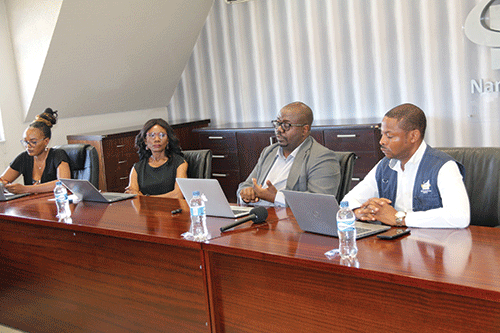The Namibia Statistics Agency (NSA) said despite challenges such as individuals refusing to be counted and tabs going missing, they have managed to complete most of the work for the population and housing census.
The agency indicated that its team is currently busy with data monitoring and evaluation before official results are released.
Some challenges include vast enumeration areas, certain farms and gated communities being locked, difficult terrains to access living structures, and poor network coverage to transmit the required data.
“For the first time, Namibia conducted a modern and digital census whereby tablets were used to collect the census data from the population, where 12 970 tablets were deployed to all regions and only 22 were lost,” stated statistician general Alex Shimuafeni during a press briefing recently.
He said this was due to robust controls and security measures put in place to safeguard the tablets. Shimuafeni assured the public that all the data that was on the lost devices was fully encrypted and no data leaks or breaches had been experienced.
Shimuafeni said despite challenges, particularly payment delays to the enumerators, the agency recruited additional temporary staff to speed up the verification process.
“Though the verification process was lengthy. The agency made sure that all payments were done according to goods and services provided during the census enumeration. We have managed to pay the enumerators and vehicle owners and we are glad we did so with the utmost diligence,” he said.
NSA’s head of communication Iipumbu Sakaria added that there were delays in the procurement of boats for the flood-prone areas in Zambezi and a helicopter for Kunene.
“There were also refusals in some suburbs, however, the action by the agency to issue the notice to comply resulted in several households reaching out for enumeration,” he said.
Sakaria noted that the population and housing census is the biggest statistical undertaking by the government, thus it is very expensive and resource-intensive.
“Even though data collection was done electronically, due process must be followed to ensure that all information collected is processed accordingly. The information must be sent out so that we can make decisions and allocate resources, monitor our plans, and plan properly for business and economic purposes and academics,” said Sakaria.
He stated that after the census is conducted, there is a post-enumeration survey, which is kept independent, meaning those in charge of that process had nothing to do with the actual enumeration.
“This is just like auditing; after that, we have data analysis and report writing where we generate a preliminary report,” he said.
The agency assured that the preliminary census results will be available in the first half of 2024 while the main reports will be available towards the second half of the year.
The public will be informed of the exact month of release.
Meanwhile, NSA Executive for Demographic and Social Statistics Paulina Ingo said Namibians should be on the lookout for other findings like fertility, ahead of the census report. NSA last week launched the mortality and causes of death in Namibia report for the period 2018 to 2021.
“Trends in causes of death provide an important summary of whether societies are making progress in reducing the burden of premature mortality and especially avoidable mortality,” said Ingo.
– psiririka@nepc.com.na



